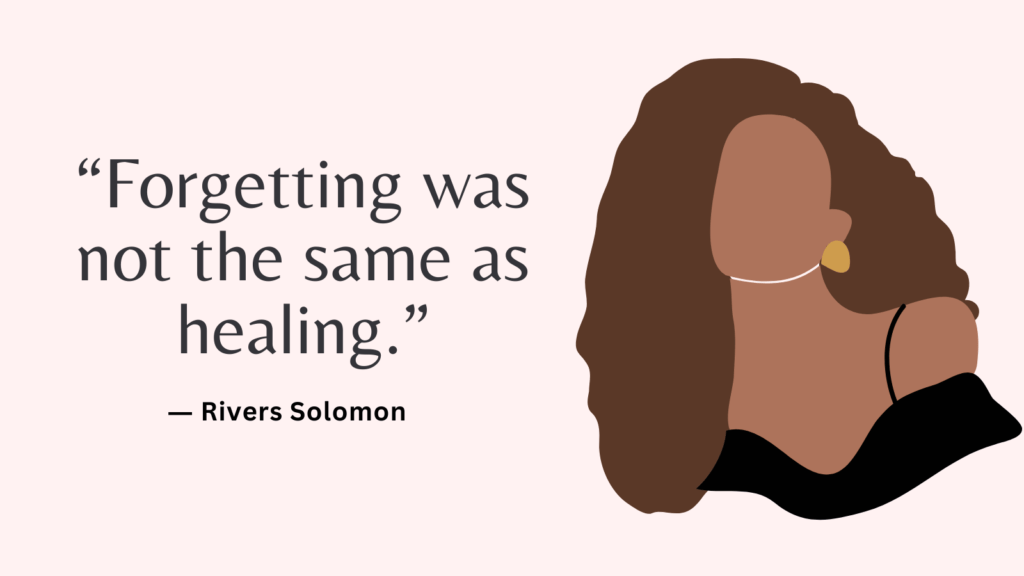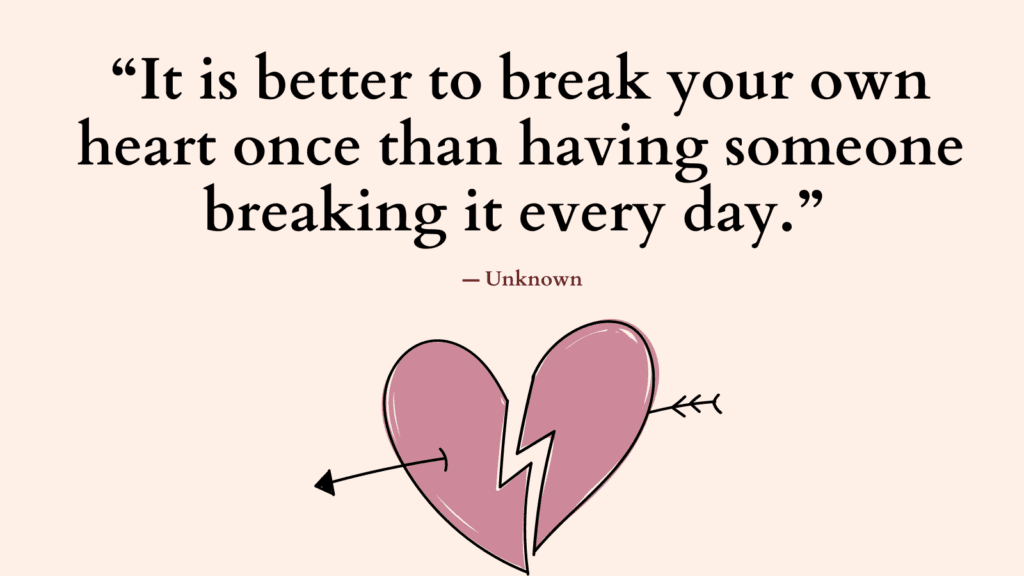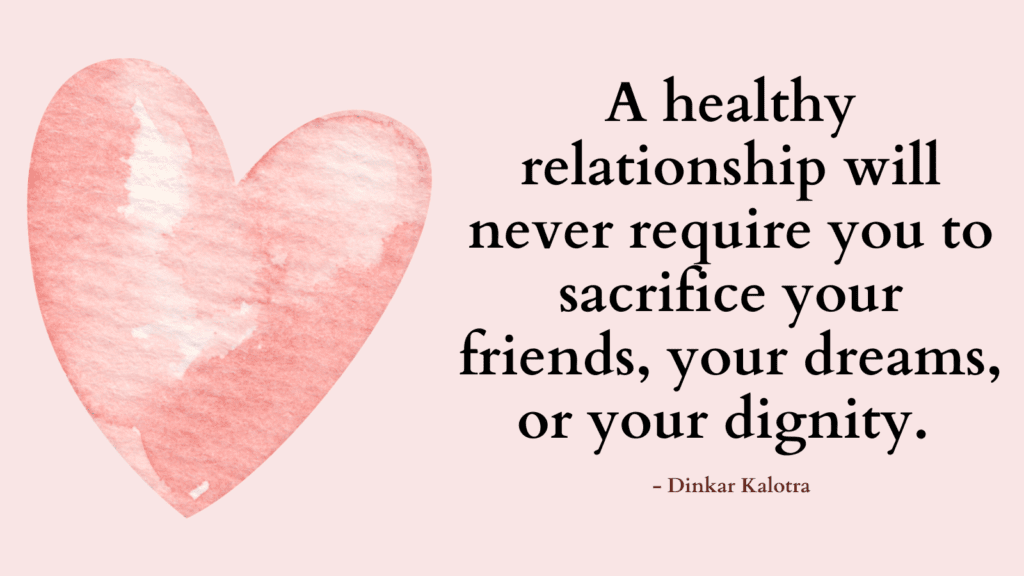This post contains “Am I Over My Ex Quiz.”
Am I Over My Ex Quiz
Results
#1. Have you stopped idealizing or romanticizing your past relationship?
#2. Do thoughts of your ex no longer dominate your mind throughout the day?
#3. Do you no longer feel a strong emotional attachment or longing for your ex?
#4. Have you let go of the desire for closure or understanding from your ex?
#5. Have you focused on personal growth and self-improvement since the breakup?
#6. Are you able to envision and plan for your future without your ex?
#7. Are you able to reminisce about the past relationship without experiencing intense sadness or longing?
#8. Are you open to forming new connections and dating other people?
#9. Have you ceased comparing potential partners to your ex?
We will not sell your information. All results are kept confidential.
This quiz is for informational purposes only. It is not meant as a diagnostic or assessment tool.
Results
The questions above represent common signs of you are over your ex. If you answered yes to most of these questions, then you may be over your ex.
Related: Top 45 Breakup Journal Prompts (FREE Breakup Worksheets)
How to Get Over Your Ex?
Getting over an ex can be a challenging process, but there are several strategies you can try to help yourself heal and move forward. Here are some suggestions:
1. Cut off contact
While it may seem difficult at first, removing all forms of communication with your ex is essential for your own healing and personal growth.
By cutting off contact, you create space and distance that allows you to focus on your own well-being and moving forward.
This means unfollowing them on social media, deleting their number, and avoiding places or events where you are likely to run into them.
Remember, this is not about being spiteful or playing games; it’s about creating healthy boundaries and giving yourself the opportunity to heal.
Cutting off contact helps in reducing the temptation to reach out, prevents reopening old wounds, and allows you to regain control of your emotions.
It also gives you a chance to rediscover yourself, nurture new hobbies, and strengthen other relationships.
Although it might be tough initially, remember that time will heal and eventually, you’ll realize just how important it was to cut off contact in order to move on and find happiness again.
Related: Top 5 Signs The No Contact Rule Is Working
2. Allow yourself to grieve
It’s natural to feel a range of emotions such as sadness, anger, and confusion after a breakup.
Give yourself permission to experience these emotions fully, as suppressing them may only prolong the healing process.
Find healthy ways to express your feelings, whether through journaling, talking to a trusted friend, or seeking professional help.
Remember, everyone grieves differently, so it’s essential to be patient with yourself and honor your unique healing journey.
For instance, if you find solace in writing, consider jotting down your thoughts and reflections on the relationship.
By allowing yourself to grieve, you are giving yourself the opportunity to process the pain and eventually move forward.
Related: Stages Of Divorce Grief (+Best 17 Tips On How To Grieve Your Divorce Even When You Still Love Him)
3. Practice self-reflection
This involves taking the time to understand yourself, your needs, and your emotions in order to heal and grow from the experience.
Start by acknowledging and accepting your feelings, allowing yourself to grieve the loss of the relationship.
Reflect on what went wrong and what you learned from it.
Did you have any unhealthy patterns or behaviors?
Take responsibility for your part in the breakup, but also be kind to yourself and avoid blaming or criticizing.
Self-reflection can help you gain clarity on what you truly want in a future relationship and what you need to work on within yourself.
For example, if you realize that you tend to lose yourself in relationships, you can focus on building a stronger sense of self before entering into a new one.
Through self-reflection, you can also identify any negative thought patterns or limiting beliefs that may be holding you back, such as believing you are unworthy of love.
By challenging and replacing these thoughts with more positive and empowering ones, you can rebuild your self-esteem and move towards a healthier mindset.
Related: Top 10 Books About Toxic Relationships
4. Seek support
Getting over a breakup can be an emotionally challenging process, but seeking support can be incredibly helpful in navigating this difficult time.
Surrounding yourself with understanding friends and family members who are willing to lend an empathetic ear can provide a safe space to express your feelings and thoughts about your ex.
Additionally, support groups or online communities dedicated to breakup recovery can offer a sense of belonging and validation as you share your experiences with others who are going through a similar journey.
Sometimes, simply talking about your emotions and listening to the stories of others can help put things into perspective and provide valuable insights on how to heal and move forward.
Seeking professional counseling or therapy is another option that offers guidance from a trained and impartial perspective.
Therapists can equip you with coping mechanisms, strategies to manage your emotions, and help you gain a deeper understanding of yourself and the breakup.
Related: Self-Abandonment: Top 5 Ways To Get Back In Touch With Yourself
5. Avoid unhealthy coping mechanisms
Getting over an ex can be challenging, but it is crucial to avoid falling into unhealthy coping mechanisms.
These temporary fixes might seem appealing at first, but they can actually hinder your healing process in the long run.
One common unhealthy coping mechanism is turning to excessive alcohol or substances to numb the pain.
While it may provide temporary relief, it prolongs the healing and can lead to dependency or other issues.
Another unhealthy coping mechanism is seeking validation through rebound relationships.
Jumping into a new relationship without addressing your emotions from the previous one can prevent you from truly moving on.
Instead, take time to focus on yourself, engage in self-care activities, and surround yourself with supportive friends and family.
6. Focus on self-care
Make sure to prioritize your needs, such as getting enough sleep, eating nutritious meals, and maintaining a regular exercise routine.
Engaging in activities that bring you joy and relaxation, whether it’s reading, painting, or spending time in nature, can also be immensely beneficial.
Taking up a new hobby or pursuing a long-lost passion can provide a sense of fulfillment and rejuvenation.
7. Challenge negative thoughts
When thoughts about your ex consume our mind, it’s important to recognize that dwelling on these thoughts only prolongs your healing process.
Instead, try to challenge any negative thoughts that arise.
For example, if you catch yourself thinking, “I’ll never find someone like them again,” remind yourself that there are plenty of other amazing individuals out there.
Focus on your own qualities and the positive aspects of your life that don’t involve your ex.
Another example might be if you think, “I’ll never be happy without them,” but it’s crucial to remember that your happiness shouldn’t solely depend on another person.
Related: Top 30 Affirmations After A Break Up (+FREE Breakup Worksheets)
8. Set new goals
By focusing on new objectives, you shift your attention away from the past and open up opportunities for personal growth and fulfillment.
Start by identifying areas of your life that could benefit from improvement or change.
Perhaps you’ve always wanted to learn a new language, travel to a foreign country, or excel in your career.
Setting achievable goals within these areas can give you a sense of purpose and excitement for the future.
For example, if you’ve always dreamed of learning how to play the guitar, sign up for lessons and dedicate regular time to practice.
Embrace this new journey as a chance to rediscover yourself and ignite passions you may have long neglected.
Conclusion
Healing from a breakup takes time and patience.
Everyone’s journey is unique, so don’t compare your progress to others.







